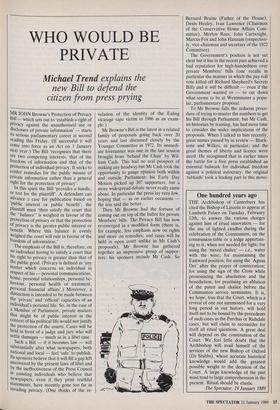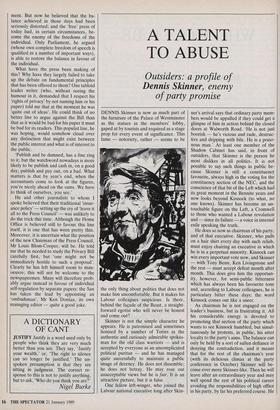WHO WOULD BE PRIVATE
Michael Trend explains the
new Bill to defend the citizen from press prying
MR JOHN Browne's Protection of Privacy BIll — which sets out to 'establish a right of Privacy against the unauthorised use or disclosure of private information' — starts its serious parliamentary career at second reading this Friday. (If successful it will come into force as an Act on 1 January next year.) The Bill 'recognises that there are two competing interests, that of the freedom of information and that of the protection of individual privacy. It seeks to Confer remedies for the public misuse of Private information rather than a general right for the protection of privacy'.
In this spirit the Bill 'provides a hurdle, or test for the plaintiff'. A defendant can advance a case for publication based on Public interest or public benefit'; the Plaintiff must 'then satisfy the court that the "balance" is weighed in favour of the Protection of privacy or that the protection of privacy is the greater public interest or benefit. Where this balance is evenly Weighed the court will rule in favour of the freedom of information.'
The emphasis of the Bill is, therefore, on an individual having to satisfy a court that his right to privacy is greater than that of the public good. (Privacy is defined as 'any matter which concerns an individual in respect of his — personal communications, home, personal relationships, personal be- haviour, personal health or treatment, Personal financial affairs'.) Moreover, a distinction is intended to be made between the 'private' and 'official' capacities of an Individual's personal life. So, in the case of a Member of Parliament, private matters that might be of public interest in the context of his political life would not justify the protection of the courts. Cases will be held in front of a judge and jury who will settle damages — much as in a libel case.
Such a Bill — if it becomes law — will substantially alter what newspapers, both national and local — feel 'safe' to publish. Its sponsors believe that it will fill a gap left uncovered by the present laws of libel and by the ineffectiveness of the Press Council In assisting individuals who believe that newspapers, even if they print truthful statements, have recently gone too far in Invading privacy. (One thinks of the re-
velation of the identity of the Ealing vicarage rape victim in 1986 as an exam- ple.)
Mr Browne's Bill is the latest in a related family of proposals going back over 20 years and last discussed closely by the Younger Committee in 1972. Its immedi- ate forerunner was one in the last session brought from 'behind the Chair' by Wil- liam Cash. This had no real prospect of making any headway but Mr Cash took the opportunity to gauge opinion both within and outside Parliament: his Early Day Motion picked up 307 supporters, but a more widespread debate never really came about. In particular the press lay very low, hoping that — as on earlier occasions — the less said the better.
Then Mr Browne had the fortune of coming out on top of the ballot for private Members' bills. The Privacy Bill has now re-emerged in a modified form (there is, for example, less emphasis now on rights and more on remedies; and cases will be held in open court unlike in Mr Cash's proposals). Mr Browne has gathered together an impressive group of suppor- ters: his sponsors include Mr Cash, Sir Bernard Braine (Father of the House), Denis Healey, Ivan Lawrence (Chairman of the Conservative Home Affairs Com- mittee), Merlyn Rees, John Cartwright, Marcus Fox and John Hannam (respective- ly, vice-chairman and secretary of the 1922 Committee).
The Government's position is not yet clear but it has in the recent past achieved a bad reputation for high-handedness over private Members' bills (one recalls in particular the manner in which the pay-roll vote killed off Richard Shepherd's Secrets Bill) and it will be difficult — even if the Government wanted to — to cut down what seems to be at Westminster a popu- lar, parliamentary proposal.
To Mr Browne falls the arduous proce- dure of trying to muster the numbers to get his Bill through Parliament; but Mr Cash, an historian by training, has had more time to consider the wider implications of the proposals. When I talked to him recently, great names passed by in review — Black- sone and Wilkes, in particular; and the great themes of liberty and licence were aired. He recognised that in earlier times the battle for a free press established an essential bulwark for individual freedom against a political autocracy; the original 'tabloids' took a leading part in this move- ment. But now he believed that the ba- lance achieved in those days had been seriously distorted; and the 'free' press of today had, in certain circumstances, be- come the enemy of the freedoms of the individual. Only Parliament, he argued (whose own complete freedom of speech is qualified in a number of important ways), is able to restore the balance in favour of the individual.
What have the press been making of this? Why have they largely failed to take up the debate on fundamental principles that has been offered to them? One tabloid leader writer (who, without seeing the humour in it, demanded that I respect his 'rights of privacy' by not naming him or his paper) told me that at the moment he was 'quite out of ideas'. He could think of no better line to argue against the Bill than that as it would be bad for his paper it must be bad for its readers. This populist line, he was hoping, would somehow cloud over any distinction that might exist between the public interest and what is of interest to the public.
'Publish and be damned, has a fine ring to it; but the watchword nowadays is more likely to be publish and cash in, on a good day; publish and pay out, on a bad. What matters is that by year's end, when the accountants come to look at the figures, you're nicely ahead on the sums. We have to think of ourselves, you see.'
He and other journalists to whom I spoke believed that their traditional 'insur- ance policy' — setting up the cry of 'leave it all to the Press Council' — was unlikely to do the trick this time. Although the Home Office is believed still to favour this line itself, it is one that has worn pretty thin. Moreover, it is uncertain what the position of the new Chairman of the Press Council, Mr Louis Blom-Cooper, will be. He told me that he needed to study the Privacy Bill carefully first, but 'one might not be immediately hostile to such a proposal'. Clearly he has left himself room to man- oeuvre; this will not be welcome to the newspapermen. Many will therefore prob- ably argue instead in favour of individual self-regulation by separate papers: the Sun has taken the lead by appointing an 'ombudsman', Mr Ken Donlan, its own managing editor — quite a good joke.



























































 Previous page
Previous page